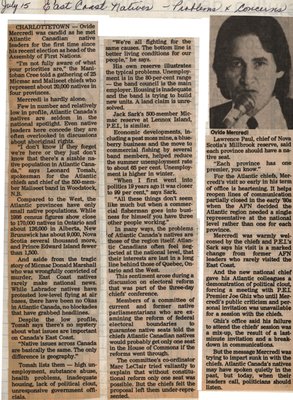"East Coast Natives - Problems and Concerns"
- Full Text
- East Coast Natives - Problems + Concerns
CHARLOTTETOWN - Ovide Mercredi was candid as he met Atlantic Canadian native leaders for the first time since his recent election as head of the Assembly of First Nations.
"I'm not fully aware of what your priorities are," the Manitoban Cree told a gathering of 25 Micmac and Maliseet chiefs who represent about 20,000 natives in four provinces.
Mercredi is hardly alone.
Few in number and relatively low in profile, Atlantic Canada's natives are seldom in the national spotlight. Even native leaders have concede they are often overlooked in discussions about aboriginal rights.
"I don't know if they forget we're here or they just don't know that there's a sizable native population in Atlantic Canada," says Leonard Tomah, spokesman for the Atlantic chiefs and chief of the 550-member Maliseet band in Woodstock, N.B.
Compared to the West, the Atlantic provinces have only small native populations. While 1986 census figures show close to 170,000 natives in Ontario and about 126,000 in Alberta, New Brunswick has about 9,000, Nova Scotia several thousand more, and Prince Edward Island fewer than 1,500.
And aside from the tragic story of Micmac Donald Marshall who was wrongfully convicted of murder, East Coast natives rarely make national news. While Labrador natives have protested low-level flying at air bases, there have been no Okas in Atlantic Canada, no blockades that have grabbed headlines.
Despite the low profile, Tomah says there's no mystery about what issues are important on Canada's East Coast.
"Native issues across Canada are basically the same. The only difference is geography."
Tomah lists them - high unemployment, substance abuse, health problems, inadequate housing, lack of political clout, unresponsive government officials.
"We're all fighting for the same causes. The bottom line is better living conditions for our people," he says.
His own reserve illustrates the typical problems. Unemployment is in the 80-per-cent range - the band council is the main employer. Housing is inadequate and the band is trying to build new units. A land claim is unresolved.
Jack Sark's 500-member Micmac reserve at Lennox Island, P.E.I., is similar.
Economic developments, including a peat moss mine, a blueberry business and the move to commercial fishing by several band members, helped reduce the summer unemployment rate to about 65 per cent. Unemployment is higher in winter.
"When I first went into politics 19 years ago it was closer to 99 per cent," says Sark.
"All these things don't seem like much but when a commercial fisherman goes into business for himself you have three other people working."
In many ways, the problems of Atlantic Canada's natives are those of the region itself. Atlantic Canadians often feel neglected at the national level, that their interests are last in a long line behind those of Quebec, Ontario and the West.
This sentiment arose during a discussion on electoral reform that was part of the three-day chiefs' conference.
Members of a committee of current and former native parliamentarians who are examining the reform of federal electoral boundaries to guarantee native seats told the chiefs Atlantic Canadian natives would probably get only one seat in the House of Commons if the reforms went through.
The committee's co-ordinator Marc LeClair tried valiantly to explain that without constitutional reform only one seat was possible. But the chiefs felt the proposal left them under-represented.
Lawrence Paul, chief of Nova Scotia's Millbrook reserve, said each province should have a native seat.
"Each province has one premier, you know."
For the Atlantic chiefs, Mercredi's visit so early in his term of office is heartening. It helps reopen lines of communication partially closed in the early '80s when the AFN decided the Atlantic region needed a single representative at the national level rather than one for each province.
Mercredi was warmly welcomed by the chiefs and P.E.I.'s Sark says his visit is a marked change from former AFN leaders who rarely visited the East Coast.
And the new national chief gave his Atlantic colleagues a demonstration of political clout, forcing a meeting with P.E.I. Premier Joe Ghiz who until Mercredi's public criticism and personal invitation was unavailable for a session with the chiefs.
Ghiz's office said his failure to attend the chiefs' session was a mix-up, the result of a last-minute invitation and a breakdown in communications.
But the message Mercredi was trying to impart sunk in with the chiefs. Atlantic Canada's natives may have spoken quietly in the past, but today, when their leaders call, politicians should listen.
- Media Type
- Newspaper
- Publication
- Item Types
- Articles
- Clippings
- Description
- "Ovide Mercredi was candid as he met Atlantic Canadian native leaders for the first time since his recent election as head of the Assembly of First Nations."
- Date of Publication
- 15 Jul 1991
- Subject(s)
- Personal Name(s)
- Mercredi, Ovide ; Tomah, Leonard ; Marshall, Donald ; Sark, Jack ; Paul, Lawrence ; Ghiz, Joe.
- Corporate Name(s)
- Assembly of First Nations.
- Local identifier
- SNPL003048v00d
- Collection
- Scrapbook #3
- Language of Item
- English
- Geographic Coverage
-
-
Prince Edward Island, Canada
Latitude: 46.23525 Longitude: -63.12671
-
- Creative Commons licence
 [more details]
[more details]- Copyright Statement
- Public domain: Copyright has expired according to Canadian law. No restrictions on use.
- Copyright Date
- 1991
- Contact
- Six Nations Public LibraryEmail:info@snpl.ca
Website:
Agency street/mail address:1679 Chiefswood Rd
PO Box 149
Ohsweken, ON N0A 1M0
519-445-2954




